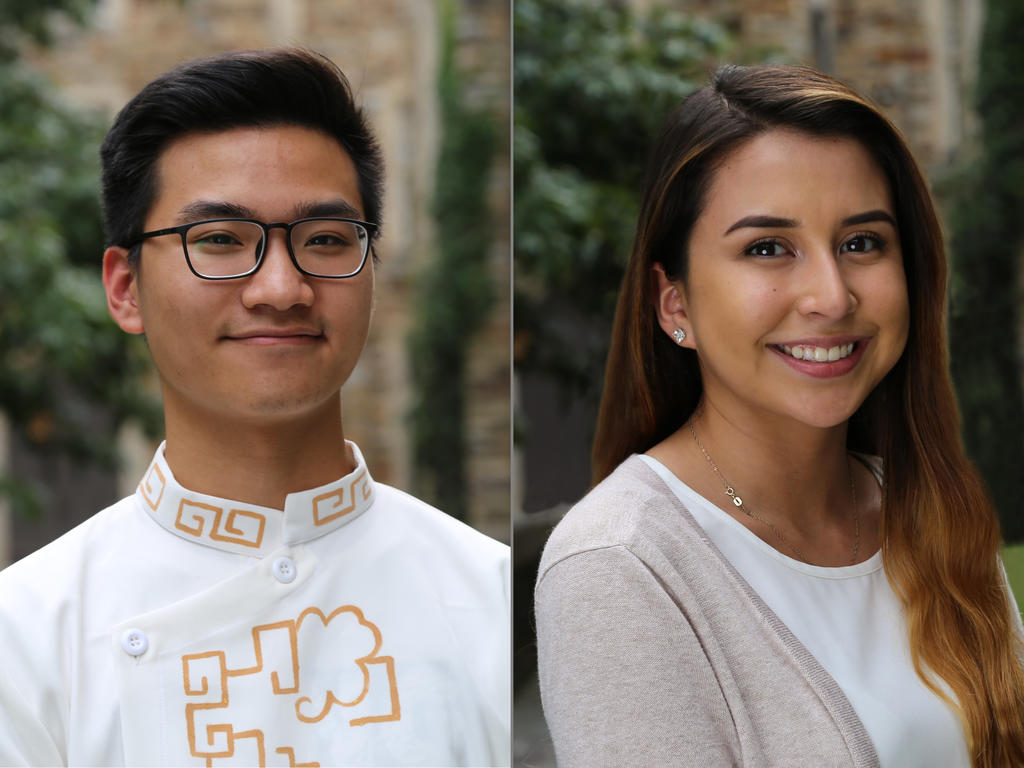Refugee and immigrant children with limited or no formal education can often feel lost in local classrooms. Some hesitate to engage because of personal trauma experienced in the countries from which they have been uprooted; others have difficulty understanding what’s going on in their classes because of language and cultural differences. But after school, there is a place where the children can go where they “don’t feel so alone,” says Rhodes rising junior Mildred Vazquez.
“A place where there is a family of volunteers waiting to support them,” adds Rhodes rising sophomore Khiem Nguyen.
This place is Refugee Empowerment Program (REP) located a five-minute drive from the Rhodes campus in the Binghampton neighborhood. REP assists the refugee and immigrant population of Memphis through education, advocacy, and support programs. Displayed on one of its walls are the words “Our Future is Limitless,” and REP volunteers and staff walk alongside participants to help them reach their full potential.
Vazquez and Nguyen have been serving as literacy coaches as part of Rhodes’ Summer Service Fellowship, which is an intensive, nine-week experience for students to learn more about Memphis and themselves through service while tackling the challenges of a local nonprofit. They work with fourth and fifth graders in the morning and high school students in the afternoon on reading, writing, and creative activities.
“That is a broad description of our roles,” says Nguyen, who is an international studies major from Vietnam. “I don’t see myself as just a teacher, because I learn a lot from the students. They teach me how to be patient, because it may take time before they will open up. Sometimes they cry, and it seems like they are giving up. And then there are other times when they open up and say they really enjoy the program. Sometimes, it’s about reading them a story or being their friend.”
Vazquez, an education and psychology major who was born in Mexico, adds that students are placed in school classrooms with their American peers by age instead of skill level, and so an older student who is behind academically can easily become frustrated. “They tell me they often are ignored because teachers don’t have the time to work with them individually. You have to understand they are not on the same grade level as other students not because they are not trying, but rather because of the circumstances they have been put in.”
Vazquez and Nguyen say they were interested in working with REP because of their prior experiences with international communities, but Rhodes’ relationship with REP goes back 16 years ago when executive director Camela Echols Blackmon and co-founder Ruth Lomo, who had fled Sudan during a civil war in the 1990s, sought the assistance of college students to provide tutoring for immigrant children.
“We were a grassroots effort and did not have the funding capacity to hire a staff in the early days. Knowing Rhodes’ commitment to community service, we looked to see how we could engage the college students around work focused on education,” says Blackmon. “Over the years of interacting with Rhodes students, I can truly say they have done amazing work here. For international studies majors, REP becomes their first glimpse of what working in another country would look like. Students who want to go into the nonprofit sector and education fields learn how to develop lesson plans and write research grants. We’re all learning from each other the true aspect of what community is, and we have made the work about the community that we are serving.”
Families placed in REP come from war-torn areas such as Rwanda, South Sudan, Burundi, Afghanistan, Somalia, Honduras, Syria, and the Democratic Republic of the Congo. From the outset, Rhodes students have been instrumental to the success and sustainability of REP's education programs, including tutoring, homework assistance, English as a Second Language classes, ACT and college prep workshops, math and language skill building, digital literacy, GED and citizenship preparation for adults, resume writing, and art and music enrichment. In 2006 and 2007, Rhodes students even staged a mock refugee camp on campus with medical tents, food rations, and photo displays of actual camps so that the invited public could better understand the plight of refugees around the world.
“When Rhodes students apply to volunteer or intern with REP, I often sit down with them to get to know their passions, because that’s where they will serve and do their best work,” says Blackmon. “Rhodes students have been our cheerleaders, and they tell those who come here that they can make it. I have even hired five individuals from Rhodes after graduation.”
Rhodes alumna Sara Babb ’07, for example, has served as education specialist, consultant, and now associate director. Muna Mohamed participated in REP as a child, later served there as a Rhodes Bonner Scholar, and then worked as an education and care coordinator. In addition, many Rhodes students awarded the prestigious Fulbright U.S. Student Program grant, which allows them to conduct research, study, and/or teach for one year abroad, have volunteered at REP.
“I’ve had other jobs and internships in the summer, but I can say this with all honesty, there hasn’t been a day when I woke up and didn’t want to come to work,” says Vazquez. “My students expect me to be here. We all want to be here, and I think that it is just because of the beauty of the program.”
